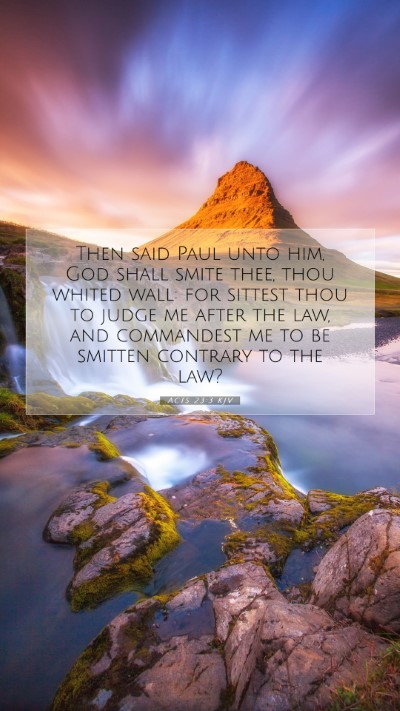Bible Verse Meaning of Acts 23:3
Acts 23:3 states, "Then Paul said to him, 'God will strike you, you whitewashed wall! Are you sitting to judge me according to the law, and yet contrary to the law you order me to be struck?'" This passage outlines an intense moment between the Apostle Paul and the high priest Ananias, reflecting themes of hypocrisy, justice, and the conflict between faith and authority.
Contextual Background
This scene is set in a courtroom where Paul is defending himself before the Sanhedrin. It is essential to understand that Paul, a Jewish Pharisee, was well-versed in the law, and his confrontation with the high priest reveals the tensions between adherence to the law and the authority wielded by religious leaders.
- High Priest Ananias: Known for his corrupt leadership, Ananias was often seen as a figure of injustice.
- Paul's Background: As a former persecutor of Christians turned apostle, Paul's knowledge of the law is significant to his defense.
- Setting of the Sanhedrin: The Jewish council was a pivotal authority in religious and civil matters, which often clashed with the early Christian movement.
Bible Verse Explanations
In his response, Paul accuses Ananias of being a "whitewashed wall," a metaphor that indicates outward purity but inner corruption. This imagery is significant in understanding the duality of appearance versus reality within spiritual and moral behaviors.
Additionally, Paul's question regarding being judged according to the law highlights the inconsistency in how justice was applied. Despite his offense, Paul emphasizes the breaking of the law by Ananias's command to hit him unlawfully, which draws attention to the moral failures of leadership.
Insights from Commentaries
-
Matthew Henry:
Henry notes that Paul’s reaction demonstrates righteous indignation against the hypocrisy displayed by the religious authorities. He emphasizes that even well-intentioned leaders can sometimes act against the very principles they stand for.
-
Albert Barnes:
Barnes elaborates on the phrase "whitewashed wall," explaining that it suggests Ananias is pretending to uphold the law while violating it in action. This duality serves as a warning against pretense in moral and religious life.
-
Adam Clarke:
Clarke interprets Paul's boldness in the face of authority as an act of courage rooted in his faith. He provides historical context, noting that such an outburst was risky for Paul, signaling the serious implications of speaking truth to power.
Theological Implications
This passage not only reflects on personal integrity but also challenges the systems of authority within religious institutions. It invites readers to consider how faith intersects with justice and the moral obligations of leadership.
The act of calling out the high priest carries theological weight as it underscores the prophetic role of Paul and his mission to expose falsehoods within the religious leadership.
Application to Daily Life
Acts 23:3 encourages individuals to examine their own lives for hypocrisy—where one's words may not align with actions. It compels believers to strive for authenticity in their faith, adhering to the principles they proclaim.
Moreover, this encounter is a reminder of the importance of standing for justice, even when faced with overwhelming authority. The call for integrity in personal and communal faith practices remains relevant in contemporary contexts.
Related Bible Cross References
- Matthew 23:27 - Jesus calls the Pharisees "whitewashed tombs" highlighting hypocrisy.
- Acts 4:18-20 - The apostles face authorities but choose to obey God over human commands.
- Romans 2:1 - Paul discusses human judgment and the importance of self-examination.
Conclusion
Acts 23:3 serves as a profound reminder of the necessity to confront injustice and hypocrisy within religious systems. As individuals seek Bible verse meanings and interpretations, this verse calls upon believers to engage with Scripture actively, promoting a deeper understanding and application of faith in daily life.
For those in Bible study groups or engaging in online Bible study, this passage offers rich material for discussion and reflection on the nature of authority, the importance of integrity, and the courage required to stand up for one's beliefs.


